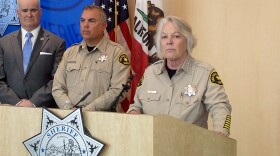This weekend the San Diego Pride festival celebrates pride and respect for lesbian, gay, bisexual, and transgender communities here and across the world. Lambda Archives, a local archive space in University Heights, stores that LGBTQ history, including the discrimination the community has overcome.
"We are the LGBTQ historical society of San Diego, we collect preserve and teach the history of San Diego, Imperial Counties and Northern Baja Mexico," said Walter Meyer, the archives' manager. The archives began as a personal collection and became a nonprofit in 1987.
Right away, visitors to the archives are greeted with a big variety of memorabilia, from an all leather outfit worn by the singer Rob Halford, who lived in Hillcrest.
"If you're a Judas Priest fan, you'll recognize the name," Meyer said. "When he came out as gay, he took a lot of grief for it."
There's also a banner with a bright red heart and the words Blood Sisters.
"The Blood Sisters were a group of lesbians who in the early days of AIDS stepped up to donate blood to their sick gay friends," Meyer said.

In fact, there are many pieces of history at Lambda Archives that remind visitors about the AIDS crisis.
For example, an artifact from Auntie Helen's, a store in North Park that originally helped people with AIDS do their laundry. It was run by local activist Gary Cheatham.

"They found a notebook they thought they had lost," Meyer said. "It was just a notebook where (Cheatham) listed the names, addresses, and phone numbers, and almost every entry has a note with a death date, 'Passed to the Lord 6/80/86, I'll love you forever, Gary.'"
Meyer said something like that notebook shows the history of the LGBT community much better than reading about it in a book.
"It's a mute testimony to the early days of AIDS and this poor man who, as he himself was sick, was trying to take care of so many of his friends and so many of their needs," he said.
RELATED: Lambda Archives Stores San Diego’s LGBTQ History
Lambda Archives also has an extensive library of books by and about members of the LGBTQ community, plus thousands of photos.
"We have about 100,000 photos in our collection, we have about 13,000 scanned, so we have a little work cut out for ourselves," Meyer said.
And then what Meyer really likes best, actual artifacts from local LGBTQ history.
"We have banners, every dyke march, AIDS walk, etcetera, we get the banners, we get the posters," he said.

That includes a Stop LaRouche banner from 1986, opposing Proposition 64, a state ballot measure backed by Lyndon LaRouche that some feared could have led to quarantines of people with AIDS.
"(It) was one of the many attempts to make life difficult for the LGBT community," Meyer said.
Lambda also has yard signs from LGBTQ political candidates, including Christine Kehoe, Bonnie Dumanis and Steve Padilla.
Plus old gay bar signs, including a stained glass window from Bacchus House, a North Park club that closed 10 years ago.
"We've identified 168 gay bars that have come and gone," Meyer said. "The peak was 1986 when 40 were open at once, and then whether AIDS took its toll or they just reached saturation point, like a neighborhood can only support so many dry cleaners until some of them have to go out of business, we're now down to about 14."


Lambda also has tons of memorabilia from past Pride festivals.
"Going back to early photographs, Pride guides, they used to print a Pride guide every year," Meyer said. "Banners and posters, buttons, ticket stubs."
The first permitted Pride was in 1975, and yes, the Lambda Archives has that permit.
"It's got a couple coffee stains and is a little wrinkled and stuff," Meyer said.
But while other libraries and archives often receive family heirlooms, such as old photos or newspaper articles or books, Meyer said that hasn't happened much at Lambda.
"You can imagine that if John Smith died and his family came out from Wisconsin to look at his stuff, and they found stuff like this, they'd burn it," he said.
That's part of the challenge of running an LGBTQ archives—when it comes to older photos and memorabilia, Meyer said there aren't that many.
"Because the world was so closeted back then, we don't have a lot of really early stuff," he said. "Prior to the 80s and 90s, really most people didn't want their picture taken in Pride or taken in a gay bar. It could ruin your life."
That's why it's important to store what Lambda Archives does have, and items from more recent history, Meyer said. It will remind people in the future that LGBTQ discrimination wasn't that far in the past.







